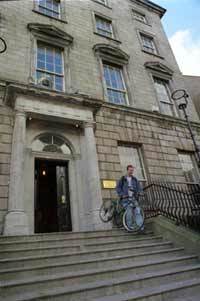
Among the most conspicuous features of Pope John Paul II’s pontificate has been his enthusiastic embrace of modern communications technology as an instrument of evangelization.
“We must be grateful,” he once wrote, “for the new technology which enables us to store information in vast man-made artificial memories, thus providing wide and instant access to the knowledge which is our human heritage, to the Church’s teaching and tradition, the words of sacred Scripture, the counsels of the great masters of spirituality, the history and traditions of the local churches, and to the ideas and experiences of initiators and innovators whose insights bear constant witness to the faithful presence in our midst of a loving Father who brings out of his treasure new things and old.”
Responding to the papal suggestion, the University of Notre Dame’s Satellite Theological Education Program (STEP) makes use of the Internet, interactive videoconferences, the Web, and numerous distance learning technologies to offer courses in theology and spiritual life to interested Catholic lay people, pastoral ministers and other believers nationwide.
“We want to place the academic resources of the University of Notre Dame in the service of the whole Church,” said STEP director Thomas C. Cummings. “The STEP courses available via our Web site, on video, CD and, eventually, DVD, make those resources much more accessible to people in all parts of the world.”
Established in 1999 as an initiative of Notre Dame’s Institute for Church Life (ICL), STEP began with a series of interactive videoconferences for ministers and lay people in the Catholic dioceses of Winona, Minn.; Erie, Pa.; Reno, Nev.; and Richmond, Va., all dioceses lacking Catholic universities. Heartened by the response to the videoconferences, the ICL staff soon decided to expand the program, placing several of Notre Dame’s best theology courses within reach of people all over the world.
Among the members of Notre Dame’s faculty participating in the program are Lawrence S. Cunningham, O’Brien Professor of Theology; Rev. Brian E. Daley, S.J., Huisking Professor of Theology; Nathan D. Mitchell, associate director in the Center for Pastoral Liturgy; Jay P. Dolan, emeritus professor of history; Maura A. Ryan, associate professor of theology; and Rev. Michael J. Baxter, C.S.C., assistant professor of theology. Other STEP faculty include Zeni Fox, associate professor of pastoral theology at Immaculate Conception Seminary School of Theology at Seton Hall University; William C. Spohn, professor of religious studies at Santa Clara University; Jane Regan of the Institute for Religious Education and Pastoral Ministry at Boston College; and Bishop Donald Trautman of Erie, Pa.
During the 2000-01 academic year, STEP began to offer six-week Internet courses in theology through the ICL’s Web site. During the 2002-03 academic year, STEP launched its own Web site, at http://step.nd.edu, where distant students could register, enroll and pay tuition fees; obtain access to 10 on-line courses; or purchase 12 CD-ROM lectures.
The course offerings are as rich and varied as a sampling of their titles suggests: “Creation: Christian Doctrine for Catechists”; “The Creed: We Believe?”; “Images of Christ Through The Ages”; “Liturgy: A Guide for the Perplexed”; “An Introduction to the New Testament”; “On Prayer”; “The American Catholic Experience”; “American Catholicism since Vatican II: Challenge of Change”; “The Christian Conscience and Ethical Dilemmas: Guidance from the Catholic Tradition”; “Eucharist: Source and Summit of the Christian Life”; “An Introduction to Sacraments”; “From Proclamation to Scripture: An Introduction to Biblical Literary Forms in the Gospels”; and “An Introduction to the Letters of St. Paul.”p. Already this year, STEP has sold more than 1,000 lectures in the CD-ROM format, and the program’s enrollment, now exceeding 300 students, is expected to gain another 100 by the year’s end. STEP students represent more than 80 different Catholic dioceses in the United States as well as communities of faith in Botswana, Canada, England, Ireland and Vietnam.
More information is available from Cummings at 574-631-5510 or Cummings.8@nd.edu
TopicID: 4015